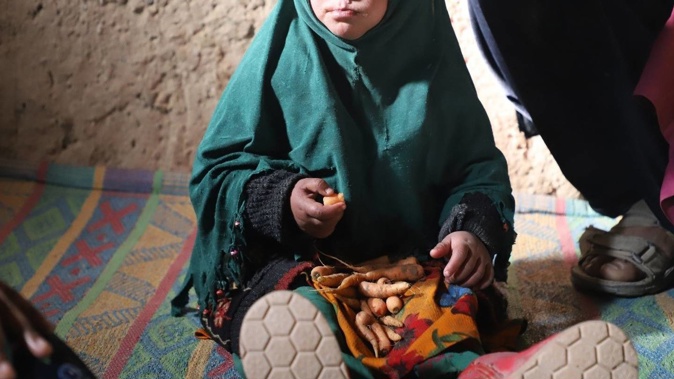
Tomorrow marks a year since Afghanistan's government fell to the Taliban in the middle of a devastating famine. Conditions are now worse than ever and as this account from local World Vision staff reveals, some parents are resorting to the unthinkable. All names have been changed to protect the identities of family members.
Sitting on the cold mud floor of her family's small house, Jamila chewed on chunks of leftover carrots with her four siblings, unaware that these were the last moments she'd spend with her family.
Very soon the 3-year-old toddler - a quiet girl with shining brown eyes and rosy cheeks - would be separated from the comfort of her mother and sisters forever, for US$600 ($940).
The choice to sell their daughter, the youngest of five girls, hadn't come easy, but her parents say rising poverty and growing unemployment made it inevitable.
/cloudfront-ap-southeast-2.images.arcpublishing.com/nzme/RQOH4RGWV2IJ3YMOY7ECMQWPEE.jpg)
Severely malnourished Afghan boy Siraj, 8 months old, is among those filling the wards at the Indira Ghandi Institute of Child Health, a state hospital in Kabul. Photo / Getty
"We are starving, all of us," her mother Massouma said. "We don't have anything to eat and we survive picking food from the garbage. That's why it's better to sell one of my daughters so my other four children can survive."
It's a choice Massouma had never wanted to make, but her husband is unemployed and her children are crying for food daily, so she didn't see an alternative.
Jamila was already born displaced; growing up in a camp of tents and simple mud houses next to the sprawling suburbs of Herat, a city of one million people in northwestern Afghanistan.
/cloudfront-ap-southeast-2.images.arcpublishing.com/nzme/ZD5MZ3SREDW57653VAZD6GLACI.jpg)
Daily life in Afghanistan's Herat, where the inhabitants are predominantly Afghans of Pashtun origin who migrated from surrounding provinces. Photo / Gertty
Years ago, her family left their native Badghis, a rural province of rolling hills spotted with bright red flowers during spring, when water became too scarce to survive.
During the hot and dry summers, most rivers evaporated and groundwater either depleted or was too salty.
Jamila's parents moved to Herat when farming yields became too low, pushed by a severe drought that killed most crops four years ago.
They hoped for a better life - a steady income, regular job opportunities and education for their children - but none materialised.
/cloudfront-ap-southeast-2.images.arcpublishing.com/nzme/ICQRDECCB6H5D36DCUH3MNSTJ4.jpg)
Houses on the outer limits of Herat, Afghanistan. Photo / Getty
Now they miss their native Badghis; its quietness and serenity, its fresh spring flowers.
Years after leaving behind their home and extended family, they still live in a single-room hut that Jamila's father Zaki built.
They still depend on people's charity and things have gradually turned for the worse.
Hunger crept in slowly. The casual labour that Zaki used to pick up daily ceased; the currency deflated with the change of the government last August.
"For several days now we didn't have any flour to bake bread. I managed to collect these carrots because the children were crying and asking for food," Zaki said, motioning towards his daughters, still chewing their meal.
He's ashamed to admit it: "The farmer had thrown them into the garbage because they weren't good anymore."
/cloudfront-ap-southeast-2.images.arcpublishing.com/nzme/K3RNUA3UVTK3CFIASCGZ5YNHKU.jpg)
A water seller in Herat, Afghanistan. Photo / Getty
On the outskirts of the camp that became the family's home over the past years, people were often seen preying on children; many of them families unable to have their own, hoping one of the families would agree to an adoption. Others - most of them older men - came hoping to purchase a young bride.
Jamila wasn't sold into marriage, but her parents reluctantly agreed to sell her to a family who were unable to have children of their own and hoped to adopt. With adoption still uncommon in Afghanistan, the process is usually handled informally: Jamila's parents would receive US$600 in exchange for their daughter. No papers would be signed, no government would make sure she'd be treated well.
"It's better to give one of my daughters away instead of having all of them die of hunger. This way, all will survive," Massouma said, her eyes filling with tears.
The decision was one she never wanted to make, but since Afghanistan's government changed last summer, poverty and inflation have skyrocketed.
Today there still isn't a functioning central banking system, while billions of Afghan private assets remain frozen.
The United Nations estimates that almost the entire population - 95 per cent - aren't eating enough food and are living below the poverty line.
Acute hunger has increased by 9 million people since last July alone; almost 5 million face acute malnutrition, the majority being children. Many of them die.
/cloudfront-ap-southeast-2.images.arcpublishing.com/nzme/2SDTE5SFI5PRQEDD3GTFF4LNLQ.jpg)
Workers hoist sacks of flour as Afghans collect a monthly ration of staple food - flour, lentils, oil and salt - to stave off impending famine. Photo / Getty
Massouma hopes that the money for Jamila will help her family survive as Afghanistan plunges into a humanitarian catastrophe that pushes many more families into similar coping mechanisms to guarantee their survival.
So far, World Vision Afghanistan has been able to provide food, kitchen garden seeds and tools as well as training to more than a million people - families like Jamila's. But it's not nearly enough. Afghanistan is home to almost 40 million people, and many more are in need. We've been working here for more than 20 years, and, with your help, we are determined to stay to make a difference for children like Jamila.
You can provide life-saving food, water, medicine, protection and more to children living in places like Afghanistan. Text DONATE to 5055 to give $3 or visit worldvision.org.nz to donate more. Right now, every $1 you donate will provide $6 of urgent support for children living in danger, thanks to World Vision's partnerships with other organisations like the World Food Programme.
To find out more, visit World Vision's childhood rescue page.
Take your Radio, Podcasts and Music with you









